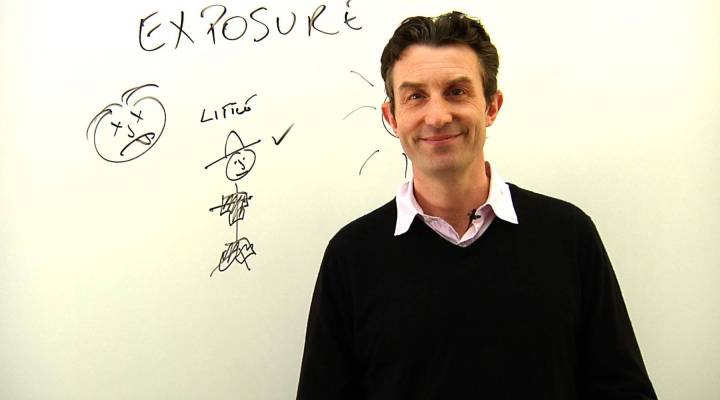
Beware overexposure to Greek bonds

Steve Chiotakis: U.S. creditors don’t have much direct exposure to Greek debt. The Bank for International Settlements tells the Wall Street
Journal that number’s about 5 percent. Exposure, of course, is one of those words you may hear a lot of when it comes to the European debt crisis.
And Marketplace senior editor and Whiteboard host
Paddy Hirsch is here with a breakdown of what
exposure means. Hey Paddy.
Paddy Hirsch: Hello Steve.
Chiotakis: So when I heard the word “exposure,” I’m not thinking good thoughts.
Hirsch: No, exposure is a negative word, right? For most of us, exposure means you’ve got hypothermia, so you’re essentially freezing to death. It’s kind of an unfortunate choice of word for financial people to use, because exposure isn’t necessarily a bad thing.
Chiotakis: It’s not?
Hirsch: Obviously not. I mean, you go out in the sun ever?
Chiotakis: Of course.
Hirsch: Well that’s good, because the sun is a great source of Vitamin D, right? But you want to keep the sun off your face, though a nice daily dose of sun on your arms and legs is actually good for you.
Chiotakis: So I should spend more time in the sun, then?
Hirsch: No! Don’t go out in the sun, Steve! You’ll get sunstroke, you’ll get melanoma, you’ll get cancer! The sun is a killer!
Chiotakis: All right, I get it. You’re telling me that I need to moderate my exposure.
Hirsch: Right, or you’re going to get burned. So to paraphrase: it’s not the sun that burns people, it’s overexposure to the sun that burns people.
Chiotakis: So what does this have to do with the Greek government debt?
Hirsch: Well Greek debt is like the sun.
Chiotakis: It is?
Hirsch: Sure. I mean, there are good reasons to buying Greek debt, right? You get paid a lot of money these days for that stuff, for now. And there may even be a guarantee.
Chiotakis: Yeah.
Hirsch: Maybe. But you don’t want too much Greek debt. It’s like you in the sun — you want to get a little, not too much.
Chiotakis: Just like on my arms and my legs, right?
Hirsch: Right. Just for some color and that Vitamin D. And if you’re smart, you won’t stay out too long.
Chiotakis: Maybe apply some sunblock?
Hirsch: Like a hedge. Exactly, like an insurance policy, in case you stay out too long, yes. But if you go and stretch out by the pool at mid-day in your swimmies — yes, you’re going to get covered in Greek bonds. They’re all over you! I don’t care how much sunblock you’re wearing — you’re going to get burned.
Chiotakis: All right, so exposure, Paddy, to bonds simply means you own bonds. It’s the overexposure that’s the problem.
Hirsch: Right: bonds don’t burn people.
Chiotakis: Yeah, I think we get the message. Paddy Hirsch, thanks.
Hirsch: Thank you.
Chiotakis: Watch Paddy explain overexposure in his Whiteboard video series here.
There’s a lot happening in the world. Through it all, Marketplace is here for you.
You rely on Marketplace to break down the world’s events and tell you how it affects you in a fact-based, approachable way. We rely on your financial support to keep making that possible.
Your donation today powers the independent journalism that you rely on. For just $5/month, you can help sustain Marketplace so we can keep reporting on the things that matter to you.












